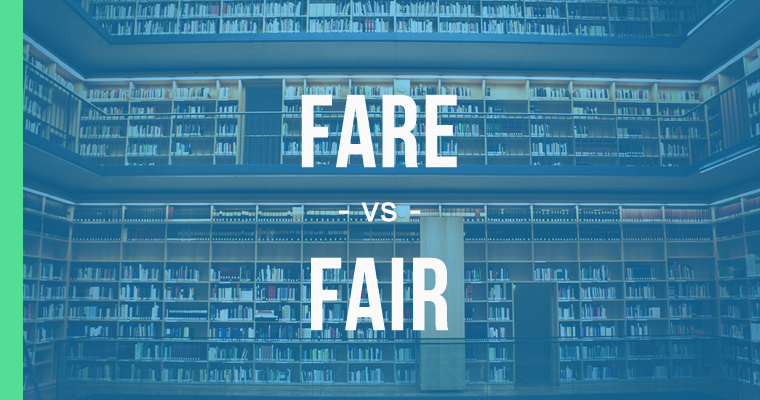Fare vs. Fair: What’s the Gist?
Both words have numerous senses and functions within the sentence.
- A fare is a fee paid when traveling. To fare is to perform in a specific way.
- A fair is a festival or celebration. Something that is fair is honest and impartial

Homophones make life difficult for writers because even though they are pronounced the same, they mean different things.
Fair and fare are homophones, but they are especially confusing since they each carry several different meanings. Still, none of these meanings overlap with each other, and it is important to remember the appropriate contexts for each of these words.
What is the Difference Between Fare and Fair?
In this article, I will compare fair vs. fare. I will use each word in at least one example sentence, so you can see it in its proper context.
Plus, I will show you a mnemonic device that you can use to help you decide whether you mean fare or fair.
When to Use Fare
Fare definition: Fare can be a noun or a verb.
As a noun, fare means payment for passage while traveling, especially air travel and public transit. Its plural form is fares.
If you are a cab driver, fare could also mean a person who requests a ride.
- Emmanuel was ejected from the train because he had not paid his fare.
- Fares skyrocket in price around the holiday season.
As a verb, fare means to go or to happen.
- The football team’s strategy did not fare well in the face of the opposition’s linebackers.
- “How fares the war?” the king asked the messenger.
Fare is a regular verb. It becomes fared in the simple past tense and faring as a present participle.
If someone asks you, “How did you fare?” you might reply, “I fared well. Thanks for asking.”
When to Use Fair
Fair definition: Fair is a word with many meanings. It can be a noun, an adjective, or an adverb.
As a noun, fair means a festival or celebration, usually organized to promote job openings or local businesses, and usually accompanied by some form of entertainment.
For example,
- Henry bought his sweetheart a corn dog and a slushy at the county fair.
Fair has many meanings as an adjective. The most common one is honest and impartial.
For example,
- Even though it cost her team the game, Jenny had to admit that the referee had made a fair call.
When fair is used as an adjective, it also carries the meaning of impartially.
- Jenny went home sad that her team had lost, but proud that they had played fair.
Outside Examples of Fare vs. Fair
- Metro’s board gave final approval Thursday to fare increases and service cuts as part of an austere fiscal 2018 budget aimed at easing the transit agency’s financial struggles. –The Washington Post
- Fair enough, for the Blueshirts have amassed the sixth-most points in the league over the past four seasons and have won as many playoff series as anyone in the NHL other than the Blackhawks over the past three postseasons. –New York Post
How to Remember These Words
Since both of these words mean so many different things in different contexts, it can be difficult to remember which is which.
Both fare and fair are nouns, but only fare is a verb. Since fare and verb both contain the letter E, you can use this shared letter as a reminder of this usage case.
Article Summary
Is fare or fair correct? Fare and fair are homophones, but they have different meanings.
- As a noun, fair means a festival or celebration.
- Fair also means honest and impartial as an adjective and honestly as an adverb.
Fare usually means payment for passage as a noun. As a verb, it means to go or to happen.
